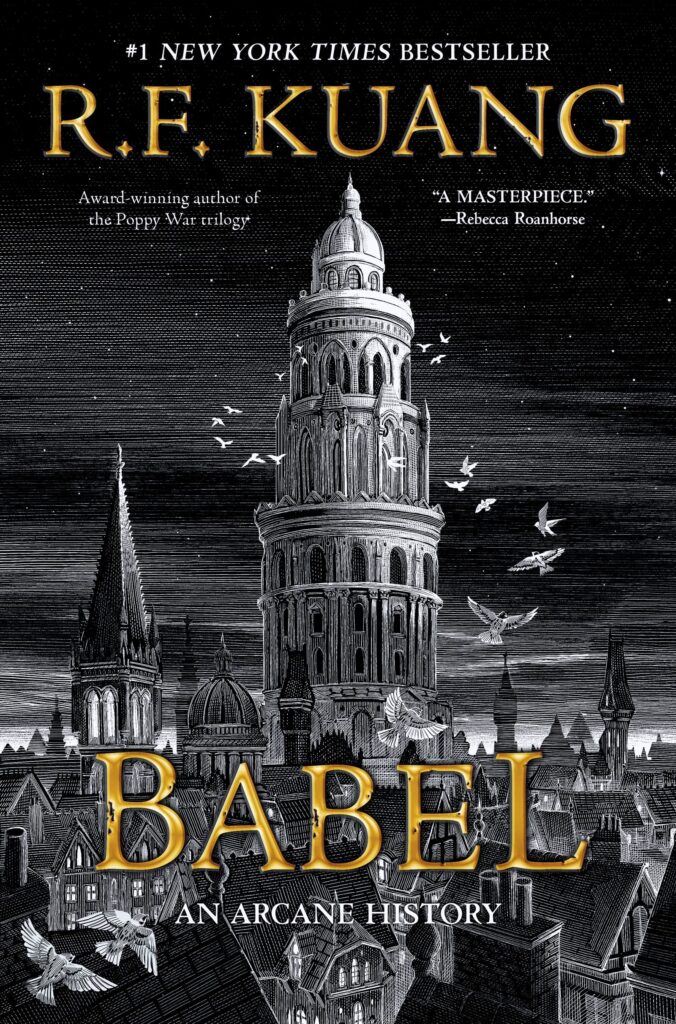
I love the feeling of tucking into the first few chapters of a hefty book and knowing that we are going to be inseparable for a good long time. Rebecca Kuang is an author that is now on my “I’ll read anything written by her” list. Last summer I was very disturbed by her best seller Yellowface. The (extremely unreliable) narrator is a frustrated writer who has been passed over by publishing. She is destroyed by her jealousy of her wildly successful Chinese classmate who resembles…well, the real-life Kuang, who is in actuality a publishing and academic wunderkind.
Like most lurid tales (see Severance), I really enjoyed summarizing it in serials to Ho, but I don’t think I could read it again. I was surprised to learn that most of Kuang’s books are historical fantasy and not like Yellowface at all. I’m sure comparisons have made between Babel (2022) and Jonathan Strange & Mr Norrell. Kuang peppers Babel with footnotes and they both take place in Georgian England. I remember Strange & Norrell being described as Harry Potter for adults and though I don’t think that description fits S&N so well, it does at times for Babel. Hermione Granger would be really happy there!
The “Babblers” are an elite cohort at Oxford who specialize in translation. It’s a book about the love of school and the camaraderie of academic suffering: “They became what they’d aspired to be since their first year–aloof, brilliant, and fatigued to the bone. They were miserable. They slept and ate too little, read too much, and fell completely out of touch with matters outside of Oxford or Babel. They ignored the life of the world; they lived only the life of the mind. They adored it” (170).
The “life of the mind” that the Babblers live for, though, has real power in every corner of the world. Their talents in translation–particularly of those who are native speakers in non-European languages–literally power the magic silver bars that are everywhere. This was my favorite part of Babel–the way its magic works. The students are lectured by Professor Playfair (Kuang has some fun with names): “The basic principles of silver-working are very simple. You inscribe a word or phrase in one language on one side, and a corresponding word or phrase in a different language on the other. Because translation can never be perfect, the necessary distortions–the meanings lost or warped in the journey–are caught, and then manifested by the silver. And that, dear students, is as close to magic as anything within the realm of natural science” (156).
Babel and Strange & Norrell both use magic in a utilitarian way–in Babel it makes ships and carriages go faster. Magic-casting has a similarly academic and theoretical feel. Basically, the magicians in both novels are nerds. In Babel, however, there is no faerie realm, Raven King, or malevolent magic. In Babel, the all powerful force is the British Empire. Magic through silver is a resource the Empire hoards to make itself utterly dominant–and its colonized subjects that are talented enough are taken from their homes to be honed as tools for the Empire.
This is the plight of Robin Swift, the hero of the book. Babel is the only true home he has. Orphaned in Canton, he was taken to England to be trained as a translator. He is encouraged to forget his Cantonese but maintain his Mandarin. His skills are indispensable, but to what end would they be used by Babel? So finally, this is really a novel about the cost of colonization and its self-rationalizations. It’s a novel about the tragedy of “other-ing.” It’s also a novel asking how change happens: its full title is Babel or the Necessity of Violence: An Arcane History of the Oxford Translators’ Revolution.
Back to Strange & Norrell. To me, Babel is nowhere in the same league as that book, but Kuang is not even 30 yet. I hope that doesn’t sound condescending. Like Yellowface, I wouldn’t return to it for loving rereads, but what a ride she takes you on. There were moments of Babel that felt prescient to VERY current times. The end of her author’s note says, “If you find any other inconsistencies, feel free to remind yourself this is a work of fiction.” That made me laugh but it is the un-fictional aspects that are the saddest. Thank you Rebecca Kuang for such a smart, original, ambitious work.
